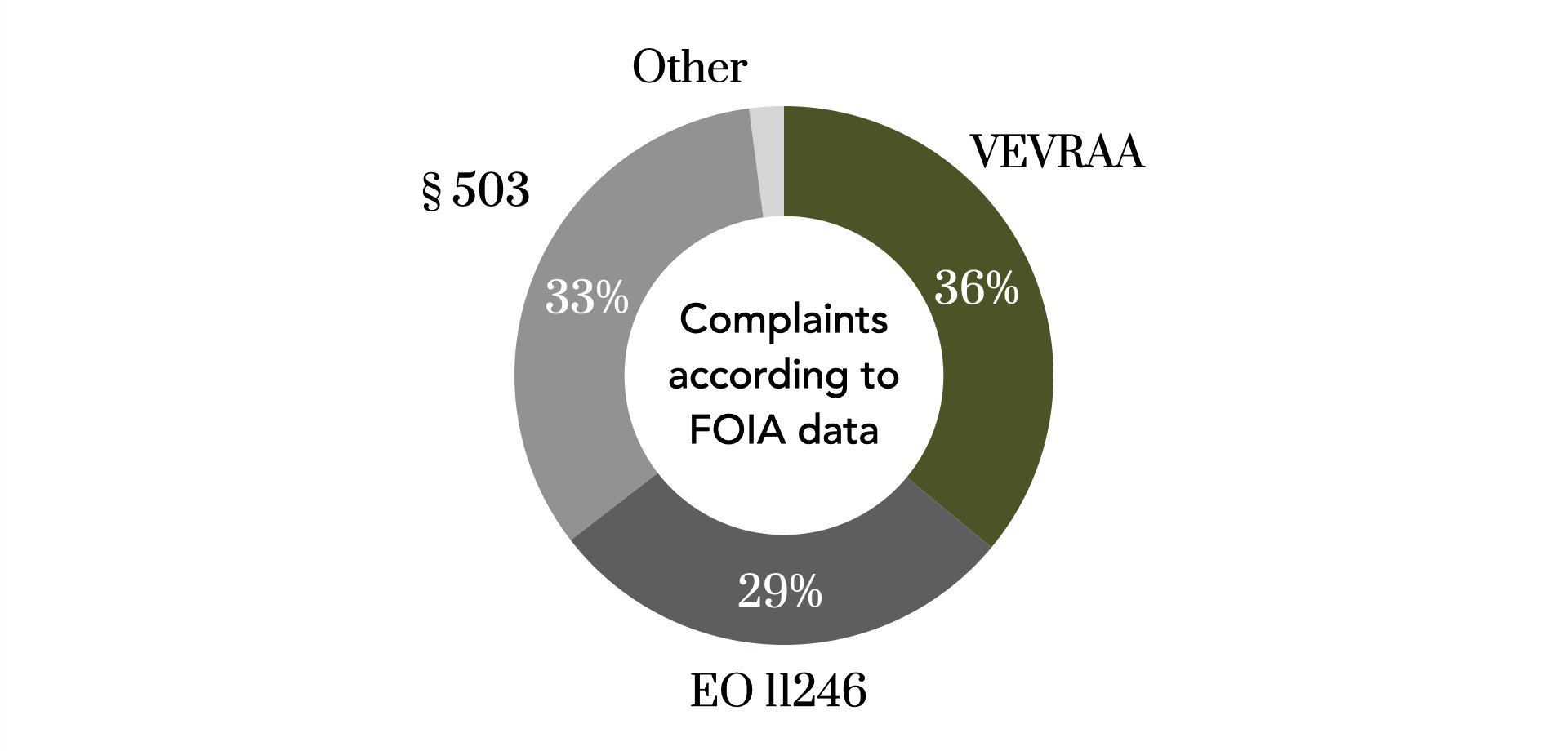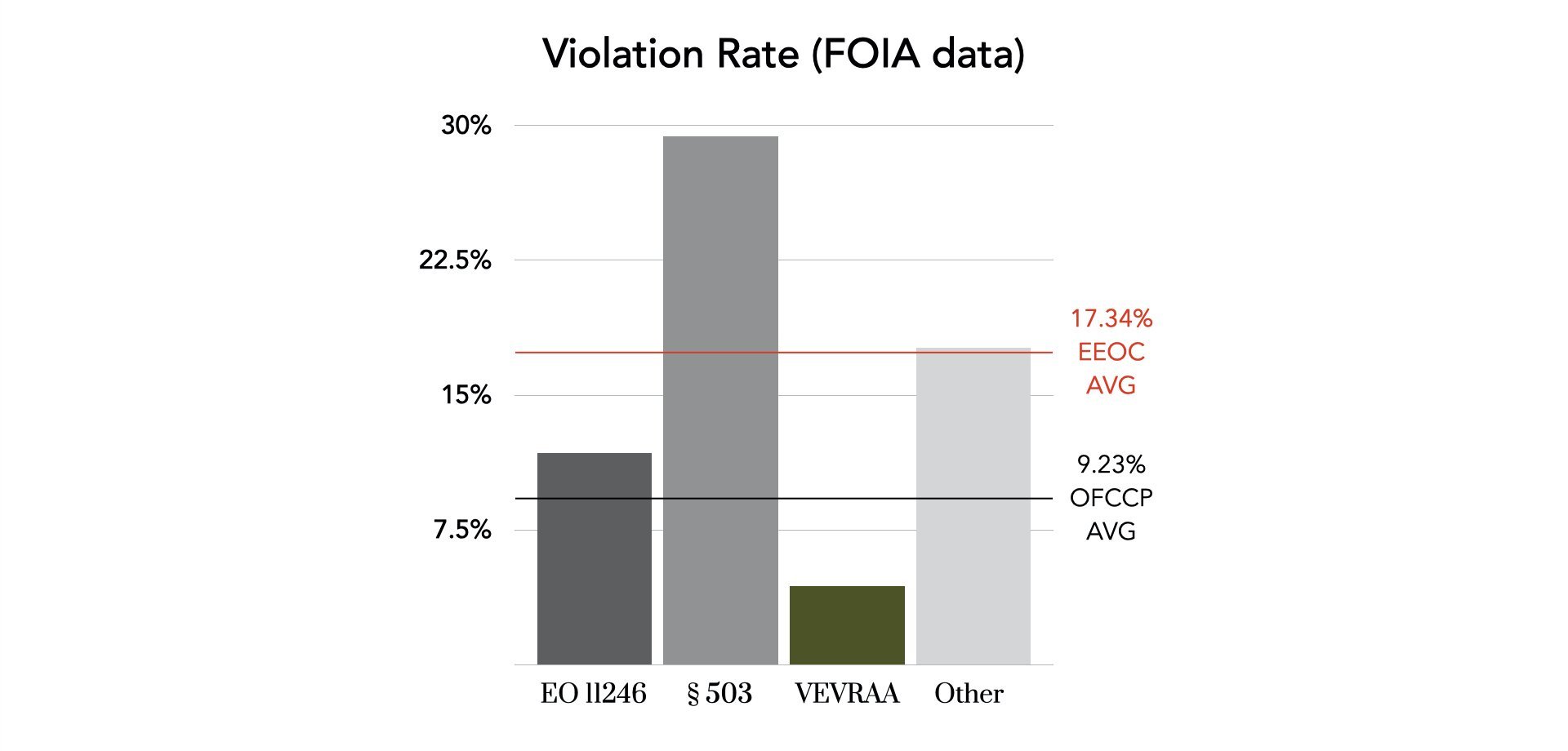VEVRAA Complaints (update)
THE ONLY AGENCY TASKED WITH TRACKING EMPLOYMENT DISCRIMINATION AGAINST VETERANS ISN’T DOING ITS JOB.
*This post has been updated here.
A few months ago I wrote about the Vietnam Era Veterans Readjustment Assistance Act (VEVRAA), a 1972 law that creates limited affirmative action for some veterans. Enforcement of VEVRAA falls to the Department of Labor’s Office of Federal Contracts, Compliance, and Programs (OFCCP). I‘ve decided to update the article because two things happened: DoL published their 2019 Veterans Employment and Training Service (VETS) report to Congress, and I acquired a large complaint dataset through a Freedom of Information Act (FOIA) request.
As I’ve written already, the VETS reports are not giving the information they are obligated to provide to Congress. 38 U.S.C. § 4212(c) requires DoL to tell Congress “the number of complaints filed… the actions taken thereon and the resolutions thereof.” From 2012 to 2016, these reports included 1) the total number of OFCCP complaints “processed,” 2) the number of those that were VEVRAA complaints, and 3) a percentage.
This information is vague and possibly misleading. Not only does it not detail what actions OFCCP has taken or any resolutions arrived at, reports do not define what is meant by “total complaints” — is this number the total number of VEVRAA complaints filed (and does that include complaints that were never investigated because they were withdrawn or found to be outside OFCCP jurisdiction?), or does it refer to the total number of complaints filed under any statute OFCCP enforces? The reports don’t say.
Starting in 2016, the VETS reports have omitted any mention of “total complaints.” The 2019 report follows this pattern, stating simply, “OFCCP processed 179 complaints on the basis of VEVRAA.” Based on the VETS reports from 2012 to 2019, one might be lead to believe that VEVRAA complaints only amount to about one in every ten complaints.
As before, the 2019 report doesn’t seem to match any known dataset. DoL enforcement data for OFCCP shows that there were 89 total complaints closed in 2019, 23 (25.84%) of which were under VEVRAA. As for the 2012 to 2018 reports, this is how they might have read if that dataset were used;
2012: 47 VEVRAA complaints, accounting for 32.19% of the 176 total complaints
2013: 86 VEVRAA complaints, accounting for 37.06% of the 232 total complaints
2014: 28 VEVRAA complaints, accounting for 18.91% of the 148 total complaints
2015: 32 VEVRAA complaints, accounting for 28.07% of the 114 total complaints
2016: 50 VEVRAA complaints, accounting for 34.01% of the 147 total complaints
2017: 37 VEVRAA complaints, accounting for 35.23% of the 105 total complaints
2018: 35 VEVRAA complaints, accounting for 31.25% of the 112 total complaints
Comparing FOIA-disclosed data to information provided to Congress.
According to data I acquired through a Freedom of Information Act request, OFCCP goes through more VEVRAA complaints every year. The FOIA dump contained detailed data from 2004 to 2014, and the DoL’s “Data Enforcement” webpage provides a complete series of datasets to fill out the rest through 2019. During that time OFCCP processed 2,168 total complaints, 781 of which were under VEVRAA. That means over a 16 year average, VEVRAA complaints made up 36% of all complaints to OFCCP.
VEVRAA investigations make up the majority of OFCCP’s caseload.
The FOIA data reveals that VEVRAA complaints make up the majority of cases processed and closed by OFCCP. This is why the Congressional VETS reports may appear to be misleading, since they seem to suggest VEVRAA complaints make up less than one in ten processed by the agency. However, despite being the largest group of complaints, OFCCP found VEVRAA violations at a rate far less than other statutes.
Broken down by complaint type, OFCCP found in favor of complainants much less often when it was a VEVRAA complaint. Claims under two laws, Executive Order 11246 (EO11246) and Section 503 (§ 503) of the Rehabilitation Act, returned violations at a rate of 11.33% and 9.81%, respectively. OFCCP found violations in “Other” complaint investigations at a rate of 13.33%. But OCFFP only found violations in just 6.79% of VEVRAA complaint investigations.
To understand how lenient OFCCP is to employers facing accusations of discrimination against protected veterans, we can compare the agency to the Equal Employment Opportunity Commission (EEOC). The EEOC found accusations to have merit an average of 17.33% of the time over the same sixteen year period covered by the FOIA release. With an average of just 9.23%, OFCCP is much more strict, and therefore friendly to employers, than EEOC.
VEVRAA investigations are disproportionately found to be without merit.
Although the data being provided to Congress by the VETS reports may not be technically false (we would need more information to confirm their veracity), they are definitely not complete. It is clear that the statutory obligations of 38 U.S.C. § 4212 are not being met.
One important take away, perhaps the most important, is that nobody knows the true extent of harassment, bias, and discrimination against veterans in employment because the only agency tasked with tracking and sharing this data to Congress is not doing so. What the FOIA release reveals is that the majority of OFCCP investigations are VEVRAA complaints, even though protected veterans’ are disproportionately told that their claims have no merit.



